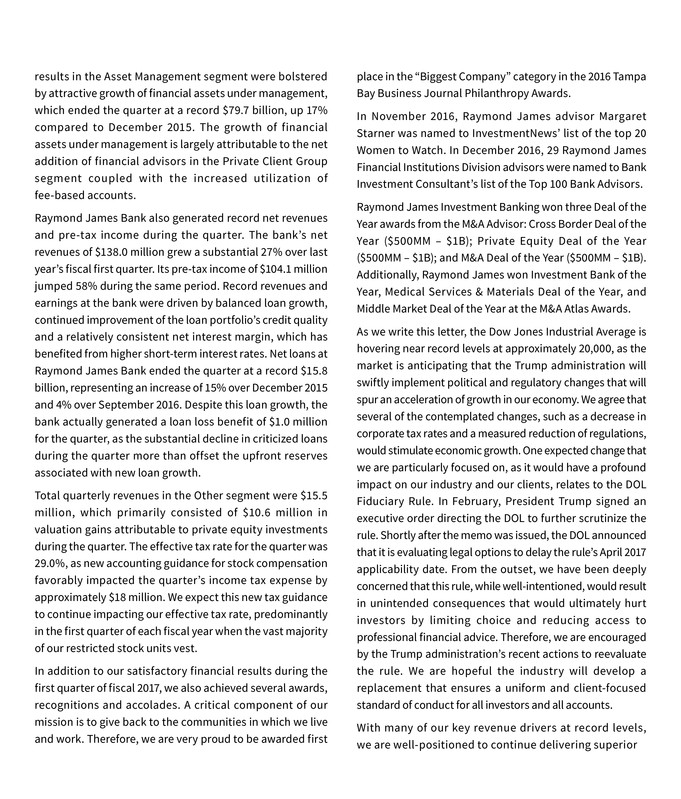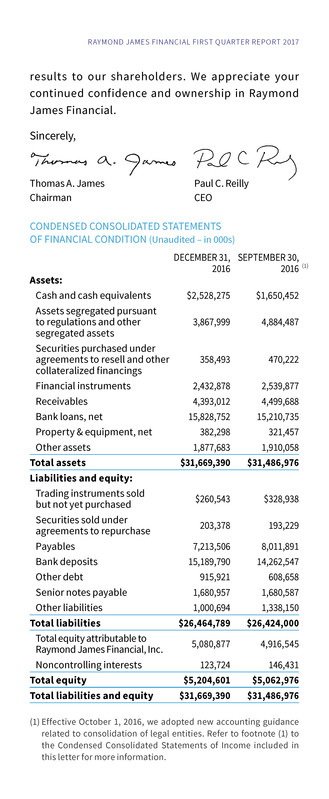Attached files
| file | filename |
|---|---|
| 8-K - 8-K - RAYMOND JAMES FINANCIAL INC | a8-k_1q17shareholdersletter.htm |

F I R S T Q U A R T E R2017
the HUMAN
connection

Dear Fellow Shareholders,
The first quarter ending December 31, 2016, proved to be
an eventful start to our fiscal year, as President Trump’s
unexpected victory propelled the domestic equity
markets to new records and resulted in a surge in U.S.
Treasury yields. Additionally, the Federal Reserve
increased its federal funds target rate by 25 basis points
in December. These factors, coupled with our strong
organic growth and the acquisitions of Alex. Brown and
3Macs in the preceding quarter, helped us achieve record
quarterly net revenues and our second best quarterly net
income. Record quarterly net revenues of $1.49 billion
increased 17% over the prior year’s fiscal first quarter and
2% over the preceding quarter. Quarterly net income of
$146.6 million, which included $12.7 million of
acquisition-related expenses associated with the
integration of the aforementioned acquisitions, improved
38% compared to the year-ago fiscal first quarter but
declined 15% from the record set in the preceding
quarter. Record quarterly net revenues were fueled by
record net revenues in the Private Client Group segment,
Asset Management segment and Raymond James Bank.
Higher revenues and a favorable tax rate during the
quarter contributed to the substantial year-over-year
increase in earnings. Meanwhile, soft investment banking
revenues and elevated legal reser ves caused the
sequential decline in earnings.
The pre-tax margin on net revenues for the quarter was
13.8%, up from 13.2% in last year’s fiscal first quarter. The
annualized return on equity for the quarter was 11.7%,
which compares favorably to 9.3% in the prior year’s
comparable quarter. Shareholders’ equity ended the
quarter at $5.1 billion, eclipsing $5 billion for the first time
and representing $35.55 of book value per share. We also
finished the quarter with records for several of our key
revenue drivers, including client asset s under
administration, financial assets under management and
net loans at Raymond James Bank.
Turning to our segment results, the Private Client Group
generated record quarterly net revenues of $1.04 billion,
a 19% annual increase, and quarterly pre-tax income of
$73.4 million, which was up 6% on a year-over-year basis but
down 31% compared to the immediately preceding
September quarter. The segment’s record net revenues and
year-over-year increase in pre-tax income were lifted by
strong organic growth, the benefit from higher short-term
interest rates, and the acquisitions of Alex. Brown and
3Macs, which closed during the second half of the preceding
quarter. The sequential decline in the segment’s pre-tax
income was largely attributable to $30 million of elevated
legal reserves. The Private Client Group continues to enjoy
exceptional retention of existing advisors as well as success
recruiting new advisors to our various affiliation options,
which along with market appreciation enabled the
segment’s client assets to achieve a record $585.6 billion,
reflecting a significant 24% increase over December 2015.
The Capital Markets segment generated quarterly net
revenues of $233.0 million and pre-tax income of $21.4
million. Quarterly net revenues in the segment were up 3%
compared to last year’s fiscal first quarter but down 18%
compared to the September 2016 quarter, as investment
banking revenues declined 42% sequentially. While the
weakness in investment banking revenues during the
quarter was largely due to the timing of closings and the
heightened market uncertainty surrounding the presidential
election, the industry continues to be challenged by
structural headwinds negatively impacting the equity
underwriting business. We are hopeful a more conducive
political and regulatory environment will make the public
equity markets more attractive for growth-oriented
companies seeking capital. The Fixed Income division
generated satisfactory results, especially considering the
spike in Treasury yields following the election, which were
aided by solid trading profits and institutional commissions
in December.
The Asset Management segment produced record quarterly
net revenues of $114.1 million and record quarterly pre-tax
income of $41.9 million, reflecting annual revenue growth of
14% and annual pre-tax income growth of 26%. Record

results in the Asset Management segment were bolstered
by attractive growth of financial assets under management,
which ended the quarter at a record $79.7 billion, up 17%
compared to December 2015. The growth of financial
assets under management is largely attributable to the net
addition of financial advisors in the Private Client Group
segment coupled with the increased utilization of
fee-based accounts.
Raymond James Bank also generated record net revenues
and pre-tax income during the quarter. The bank’s net
revenues of $138.0 million grew a substantial 27% over last
year’s fiscal first quarter. Its pre-tax income of $104.1 million
jumped 58% during the same period. Record revenues and
earnings at the bank were driven by balanced loan growth,
continued improvement of the loan portfolio’s credit quality
and a relatively consistent net interest margin, which has
benefited from higher short-term interest rates. Net loans at
Raymond James Bank ended the quarter at a record $15.8
billion, representing an increase of 15% over December 2015
and 4% over September 2016. Despite this loan growth, the
bank actually generated a loan loss benefit of $1.0 million
for the quarter, as the substantial decline in criticized loans
during the quarter more than offset the upfront reserves
associated with new loan growth.
Total quarterly revenues in the Other segment were $15.5
million, which primarily consisted of $10.6 million in
valuation gains attributable to private equity investments
during the quarter. The effective tax rate for the quarter was
29.0%, as new accounting guidance for stock compensation
favorably impacted the quarter’s income tax expense by
approximately $18 million. We expect this new tax guidance
to continue impacting our effective tax rate, predominantly
in the first quarter of each fiscal year when the vast majority
of our restricted stock units vest.
In addition to our satisfactory financial results during the
first quarter of fiscal 2017, we also achieved several awards,
recognitions and accolades. A critical component of our
mission is to give back to the communities in which we live
and work. Therefore, we are very proud to be awarded first
place in the “Biggest Company” category in the 2016 Tampa
Bay Business Journal Philanthropy Awards.
In November 2016, Raymond James advisor Margaret
Starner was named to InvestmentNews’ list of the top 20
Women to Watch. In December 2016, 29 Raymond James
Financial Institutions Division advisors were named to Bank
Investment Consultant’s list of the Top 100 Bank Advisors.
Raymond James Investment Banking won three Deal of the
Year awards from the M&A Advisor: Cross Border Deal of the
Year ($500MM – $1B); Private Equity Deal of the Year
($500MM – $1B); and M&A Deal of the Year ($500MM – $1B).
Additionally, Raymond James won Investment Bank of the
Year, Medical Services & Materials Deal of the Year, and
Middle Market Deal of the Year at the M&A Atlas Awards.
As we write this letter, the Dow Jones Industrial Average is
hovering near record levels at approximately 20,000, as the
market is anticipating that the Trump administration will
swiftly implement political and regulatory changes that will
spur an acceleration of growth in our economy. We agree that
several of the contemplated changes, such as a decrease in
corporate tax rates and a measured reduction of regulations,
would stimulate economic growth. One expected change that
we are particularly focused on, as it would have a profound
impact on our industry and our clients, relates to the DOL
Fiduciary Rule. In February, President Trump signed an
executive order directing the DOL to further scrutinize the
rule. Shortly after the memo was issued, the DOL announced
that it is evaluating legal options to delay the rule’s April 2017
applicability date. From the outset, we have been deeply
concerned that this rule, while well-intentioned, would result
in unintended consequences that would ultimately hurt
investors by limiting choice and reducing access to
professional financial advice. Therefore, we are encouraged
by the Trump administration’s recent actions to reevaluate
the rule. We are hopeful the industry will develop a
replacement that ensures a uniform and client-focused
standard of conduct for all investors and all accounts.
With many of our key revenue drivers at record levels,
we are well-positioned to continue delivering superior

DECEMBER 31,
2016
SEPTEMBER 30,
2016
Assets:
Cash and cash equivalents $2,528,275 $1,650,452
Assets segregated pursuant
to regulations and other
segregated assets
3,867,999 4,884,487
Securities purchased under
agreements to resell and other
collateralized financings
358,493 470,222
Financial instruments 2,432,878 2,539,877
Receivables 4,393,012 4,499,688
Bank loans, net 15,828,752 15,210,735
Property & equipment, net 382,298 321,457
Other assets 1,877,683 1,910,058
Total assets $31,669,390 $31,486,976
Liabilities and equity:
Trading instruments sold
but not yet purchased $260,543 $328,938
Securities sold under
agreements to repurchase 203,378 193,229
Payables 7,213,506 8,011,891
Bank deposits 15,189,790 14,262,547
Other debt 915,921 608,658
Senior notes payable 1,680,957 1,680,587
Other liabilities 1,000,694 1,338,150
Total liabilities $26,464,789 $26,424,000
Total equity attributable to
Raymond James Financial, Inc. 5,080,877 4,916,545
Noncontrolling interests 123,724 146,431
Total equity $5,204,601 $5,062,976
Total liabilities and equity $31,669,390 $31,486,976
CONDENSED CONSOLIDATED STATEMENTS
OF FINANCIAL CONDITION (Unaudited – in 000s)
R AYMOND JAMES FINANCIAL FIRST QUARTER REPORT 2017
Sincerely,
Thomas A. James Paul C. Reilly
Chairman CEO
results to our shareholders. We appreciate your
continued confidence and ownership in Raymond
James Financial.
(1) Effective October 1, 2016, we adopted new accounting guidance
related to consolidation of legal entities. Refer to footnote (1) to
the Condensed Consolidated Statements of Income included in
this letter for more information.
(1)

(1) As a result of our October 1, 2016, adoption of the new
consolidation guidance, we deconsolidated a number of tax
credit fund variable interest entities (VIEs) that had been
previously consolidated. We determined that under the
new guidance, we are no longer deemed to be the primary
beneficiary of these VIEs. We applied the new consolidation
guidance on the full retrospective basis, meaning that we have
reflected the adjustments arising from this adoption as of the
beginning of our earliest comparative period presented. Certain
prior period amounts have been revised from those reported in
the prior periods to conform to the current presentation. There
was no net impact on our Condensed Consolidated Statements
of Income and Comprehensive Income for the prior year period
as the net change in revenues, interest and other expenses
was offset by the impact of the deconsolidation on the net loss
attributable to noncontrolling interests.
(2) Effective October 1, 2016, we adopted new accounting
guidance simplifying certain aspects of accounting for stock
compensation. Our adoption of the new stock compensation
simplification guidance impacts our determination of income
tax expense. Generally, the amount of compensation cost
recognized for financial reporting purposes varies from the
amount that can ultimately be deducted on the tax return for
share-based payment awards. Under the prior guidance, the
tax effects of deductions in excess of compensation expense
(“windfalls”), as well as the tax effect of any deficiencies
(“shortfalls”), were recorded in equity to the extent of
previously recognized windfalls, with any remaining shortfall
recorded in income tax expense. Under the new guidance,
all tax effects related to share-based payments are recorded
through tax expense in the periods during which the awards are
exercised or vest, as applicable. Under the transition provisions
of the new guidance, we have applied this new guidance
prospectively to excess tax benefits arising from vesting
after the October 1, 2016, adoption date. This new guidance
favorably impacted our current period income tax expense by
approximately $18 million.
(3) The Other segment includes the results of our principal capital
and private equity activities as well as certain corporate
overhead costs of Raymond James Financial, including the
interest costs on our public debt, and the acquisition and
integration costs associated with certain acquisitions.
CONDENSED CONSOLIDATED STATEMENTS OF INCOME (Unaudited – in 000s, Except per Share Amounts)
CONSOLIDATED RESULTS BY SEGMENT (unaudited – in 000s)
Revenues:
Private Client Group $ 1,043,316 $ 874,445
Capital Markets 236,982 228,978
Asset Management 114,096 100,238
Raymond James Bank 144,517 112,726
Other (3) 15,459 4,400
Intersegment eliminations (25,602) (19,930)
Total revenues $ 1,528,768 $ 1,300,857
Pre-tax income (loss) (excluding noncontrolling interests):
Private Client Group $ 73,358 $ 69,140
Capital Markets 21,444 25,168
Asset Management 41,909 33,366
Raymond James Bank 104,121 65,865
Other (3) (34,453) (25,201)
Pre-tax income (excluding noncontrolling interests) $ 206,379 $ 168,338
Three Months Ended
December 31, 2016 December 31, 2015
Revenues:
Securities commissions and fees $ 984,385 $ 849,662
Investment banking 61,425 57,553
Investment advisory and related administrative fees 108,243 98,602
Interest 182,782 142,472
Account and service fees 148,791 116,823
Net trading profit 20,555 22,169
Other 22,587 13,576
Total revenues 1,528,768 1,300,857
Interest expense (35,966) (26,699)
Net revenues 1,492,802 1,274,158
Non-interest expenses:
Compensation, commissions and benefits 1,006,467 866,398
Communications and information processing 72,161 72,138
Occupancy and equipment costs 46,052 41,789
Clearance and floor brokerage 12,350 9,996
Business development 35,362 40,624
Investment sub-advisory fees 19,295 14,554
Bank loan loss provision (1,040) 13,910
Acquisition-related expenses 12,666 1,872
Other 81,974 42,804
Total non-interest expenses 1,285,287 1,104,085
Income including noncontrolling interests and before provision for income taxes 207,515 170,073
Provision for income taxes 59,812 62,009
Net income including noncontrolling interests 147,703 108,064
Net loss attributable to noncontrolling interests 1,136 1,735
Net income attributable to Raymond James Financial, Inc. $ $146,567 $ $106,329
Net income per common share – diluted $ 1.00 $ 0.73
Weighted-average common and common equivalent
shares outstanding – diluted 145,675
146,141
(1)
(1)
(2)

International Headquarters:
The Raymond James Financial Center
880 Carillon Parkway // St. Petersburg, FL 33716
800.248.8863 // raymondjames.com
© 2017 Raymond James Financial
Raymond James® is a registered trademark of Raymond James Financial, Inc.
16-Fin-Rep-0039 KM 2/17
Stock Traded: NEW YORK STOCK EXCHANGE
Stock Symbol: RJF
corporate profile
Raymond James Financial, Inc. (NYSE: RJF) is a leading
diversified financial services company providing
private client, capital markets, asset management,
banking and other services to individuals, corporations
and municipalities. Its three principal wholly owned
broker/dealers, Raymond James & Associates,
Raymond James Financial Services and Raymond
James Ltd., have approximately 7,100 financial advisors
serving approximately 3 million client accounts in more
than 2,900 locations throughout the United States,
Canada and overseas. Total client assets are
approximately $622 billion. Public since 1983, the firm
has been listed on the New York Stock Exchange since
1986 under the symbol RJF. Additional information is
available at raymondjames.com.
